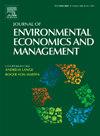Window dressing: Changes in atmospheric pollution at boundaries in response to regional environmental policy in China
Abstract
In decentralized environmental governance, local governments are likely to adopt the “beggar-thy-neighbor” strategy to relax regulations at boundaries. This study investigates the impact of China's Joint Atmospheric Prevention and Control Policy (JAPCP) in “2 + 26” cities enforced by the central government on pollution at provincial boundaries. The theoretical model suggests that dual incentives for environmental protection and economic growth may prompt local governments to reduce boundary pollution within the JAPCP-covered area while relocating pollution to uncovered boundaries. Based on Shandong Province data using the difference-in-differences approach, our analysis reveals a 9.6% decline in the air quality at JAPCP-covered boundaries compared to non-boundary areas and a 5.3% increase at JAPCP-uncovered boundaries, which is associated with migration of key regulated industries. Through examining annual work reports, we provide evidence that local governments modify regulatory intensity at various boundaries. These findings indicate that, while regional environmental policies are intended to promote inter-jurisdictional cooperation, the local government responses lead to unintended costs.

 求助内容:
求助内容: 应助结果提醒方式:
应助结果提醒方式:


